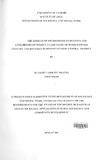| dc.contributor.author | Ng'ondu, Caroline N | |
| dc.date.accessioned | 2012-11-13T12:28:47Z | |
| dc.date.available | 2012-11-13T12:28:47Z | |
| dc.date.issued | 2011 | |
| dc.identifier.uri | http://erepository.uonbi.ac.ke:8080/handle/123456789/3309 | |
| dc.description.abstract | The main objective of this study was to investigate the role of micro credit programs in women's empowerment. This study was guided by the Human Development Approach. The study adopted a descriptive survey research design. The target population for this study was women who were engaged in micro credit activities in Meru Central District. Simple random sampling was used to select a sample of 10 groups of women under Faulu Kenya microcredit. In total, 80 individual women in the Microfinance Institution participated in the study.
Data collection techniques involved interviewing and Focused Group Discussions for which a questionnaire was used as the major data collection tool. Majority (61 %) of the respondents indicated that they got their source of business finance from loans from the Micro-Finance Institutions. The regression analysis shows a strong relationship r=69 and ~= 0.353 which shows that thirty five point three per cent of the change/improvement in women empowerment can be explained by the on-going microcredit activities. This relationship is not weak and can be used to explain/predict the rate of women empowerment by studying the microcredit activities.
The study concludes that micro credit has increased women's participation in decision making in their own homes and in the community. The study recommends that institutions should reach out to poor women living in diverse socioeconomic environments. This will help the women in these areas to be independent, enlightened, proactive and liberated. The study suggests further study with regard to major constraints being experienced by women while operating their micro enterprises | en_US |
| dc.language.iso | en_US | en_US |
| dc.publisher | University of Nairobi, Kenya | en_US |
| dc.title | The effects of Microcredit on business and livelihoods of women: a case study of women-owned grocery and boutique businesses in Meru Central District | en_US |
| dc.title.alternative | Thesis (MA) | en_US |
| dc.type | Thesis | en_US |

